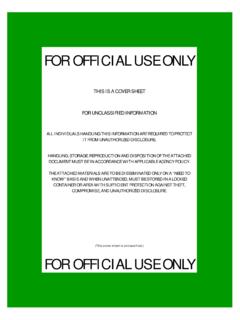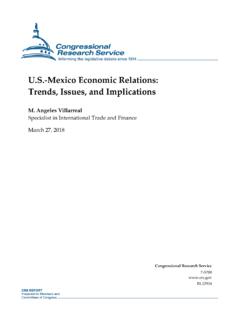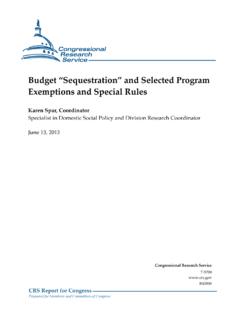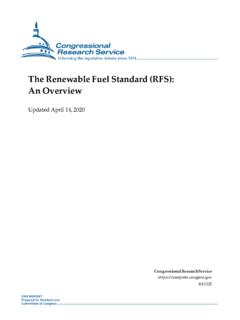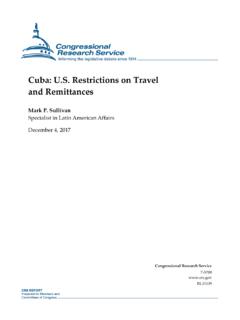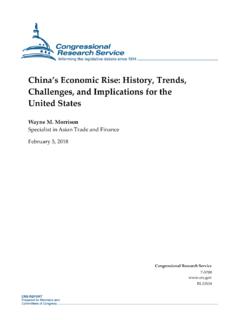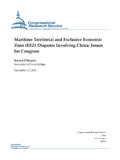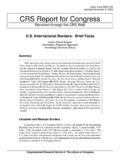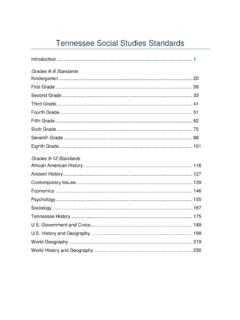Transcription of Congressional Nominations to U.S. Service Academies: An ...
1 Congressional Nominations to Service Academies: An Overview and Resources for Outreach and Management R. Eric Petersen Specialist in American National Government Sarah J. Eckman Analyst in American National Government April 13, 2017 Congressional Research Service 7-5700 RL33213 Congressional Nominations to Service Academies: An Overview Congressional Research Service Summary Members of Congress are authorized by law to nominate candidates for appointment to four Service academies. These schools are the Military Academy, the Naval Academy, the Air Force Academy, and the Merchant Marine Academy. The fifth Service academy, the Coast Guard Academy, does not require a Congressional nomination for appointment.
2 These institutions prepare college-age Americans to be officers of the uniformed services. Upon graduation, Service academy graduates are commissioned as officers in the active or reserve components of the military or merchant marine for a minimum of five years. The nomination of constituents to one of the Service academies can provide Members of Congress with the opportunity to perform community outreach and other representational duties. In some states and Congressional districts, Nominations are highly competitive. Others are less competitive, and some offices do not receive expressions of interest from enough applicants to fill the number of Nominations allocated.
3 Consequently, some Congressional offices might need to dedicate considerable staff resources to the selection process to identify qualified candidates, while others can incorporate Service academy Nominations alongside other constituent Service work such as casework. The nomination authorities, number of appointments, and criteria establishing the qualifications of potential Service academy appointees are set by statute, federal regulations, and policies established by each academy. No laws or regulations govern Congressional nomination processes, as long as Nominations are submitted by deadlines established by the academies and comply with chamber ethics rules.
4 Each Congressional office with nominating authority may develop its own process for managing its Service academy Nominations . Some offices handle Nominations internally, assigning the task of managing applicant files and developing nomination recommendations to a staff member. Other offices assign staff to oversee Nominations -related activities but delegate the screening and development of nomination recommendations to a volunteer panel, which could be charged with screening or interviewing applicants. This report describes statutory requirements for allocating Congressional Nominations to Service academies. It also identifies the qualifications that must be met by potential nominees, as established by statute and each academy.
5 Finally, sample documents that could be used by Congressional offices at various stages of the nomination selection process are included. These documents provide basic information and can be customized to fit the specific needs of individual office policies. Congressional Nominations to Service Academies: An Overview Congressional Research Service Contents Congressional Approaches .. 1 Appointment Criteria .. 4 Department of Defense Academies .. 5 Noncongressional DOD Service Academy Nominations and Appointments .. 6 United States Merchant Marine Academy .. 7 United States Coast Guard Academy .. 8 Applicant Qualifications .. 9 Figures Figure 1. General Timelines for Service Academy Nomination Application, and Appointment Processes.
6 4 Tables Table 1. Distribution of Non- Congressional Nominations to Department of Defense Service Academies, by Authority .. 7 Table 2. Distribution of Seats Available for Congressional Nomination to the United States Merchant Marine Academy, by State .. 8 Table 3. Websites for Preliminary Application to United States Service Academies .. 10 Appendixes Appendix A. Sample Initial Contact Letter .. 11 Appendix B. Sample Information Sheet .. 12 Appendix C. Sample Application Information .. 14 Appendix D. Sample Nomination Application .. 16 Appendix E. Sample Post-Nomination Letter .. 18 Contacts Author Contact Information .. 18 Congressional Nominations to Service Academies: An Overview Congressional Research Service 1 embers of Congress are authorized by law to nominate candidates for appointment to four Service These schools are the Military Academy (USMA), West Point, NY; the Naval Academy (USNA), Annapolis, MD; the Air Force Academy (USAFA), Colorado Springs, CO; and the Merchant Marine Academy (USMMA), Kings Point, NY.
7 The fifth Service academy, the Coast Guard Academy (USCGA), New London, CT, does not require a Congressional nomination for appointment. These institutions provide college-age Americans with a tuition-free,2 four-year undergraduate education and prepare them to be officers of some of the uniformed Upon graduation, Service academy graduates are commissioned as officers in the active or reserve components of the military or the merchant marine for a minimum of five years. Although it is an essential component of the appointment process, a Congressional nomination does not guarantee an individual s admission or appointment to a Service academy. In addition to securing a nomination, a candidate must also submit an application packet and fulfill other Service academy requirements, some of which are described in the Applicant Qualifications section of this report.
8 Even when a candidate meets all these requirements and is deemed to be qualified for admission, he or she may not receive an official appointment, due to the limited number of spaces available at each Service The nomination of constituents to one of the Service academies can provide Members of Congress with the opportunity to perform community outreach and other representational activities. In some states and Congressional districts, Nominations are highly competitive. Others are less competitive, and some offices do not receive expressions of interest from enough applicants to fill the number of Nominations allocated. Consequently, some Congressional offices may need to dedicate considerable staff resources to the selection process to identify qualified candidates, while others can incorporate Service academy Nominations alongside other constituent Service activities such as Congressional Approaches The nomination authorities, number of appointments, and criteria establishing the qualifications of potential Service academy appointees are set in statute, federal regulations, and policies established by each academy.
9 No laws or regulations govern Congressional nomination processes, 1 Historical records indicate that the Congressional nomination served to help democratize and diversify the ranks of military officers. Congressional Nominations ensured that academy appointees represented all geographic areas of the United States, came from a diverse set of family backgrounds, and would not be subject to executive branch political patronage. See Congress, House Committee on Military Affairs, Military Academy, report to accompany Bill No. 367, 28th Cong., 1st sess., May 15, 1844, Rep. No. 476, pp. 14-16; Congress, House Committee on Military Affairs, West Point Academy, report to accompany Bill No.
10 444, 29th Cong., 1 sess., May 11, 1846, Rep. No. 660, p. 2. 2 While tuition is covered for all students in Service academies, some academies may require students to pay fees for some services and activities. See USMMA, Description of Midshipman Fees, 3 This report does not discuss admission to the Uniformed Services University of the Health Sciences , which provides graduate education in medicine, nursing, and other health fields for members of the military and the United States Public Health Service , and for which no Congressional Nominations are required for admission. 4 based on admissions data for the class of 2019 from USMA, USNA, USAFA, and USMMMA, available on the academies websites, about 50% of qualified applicants were granted academy appointments.


